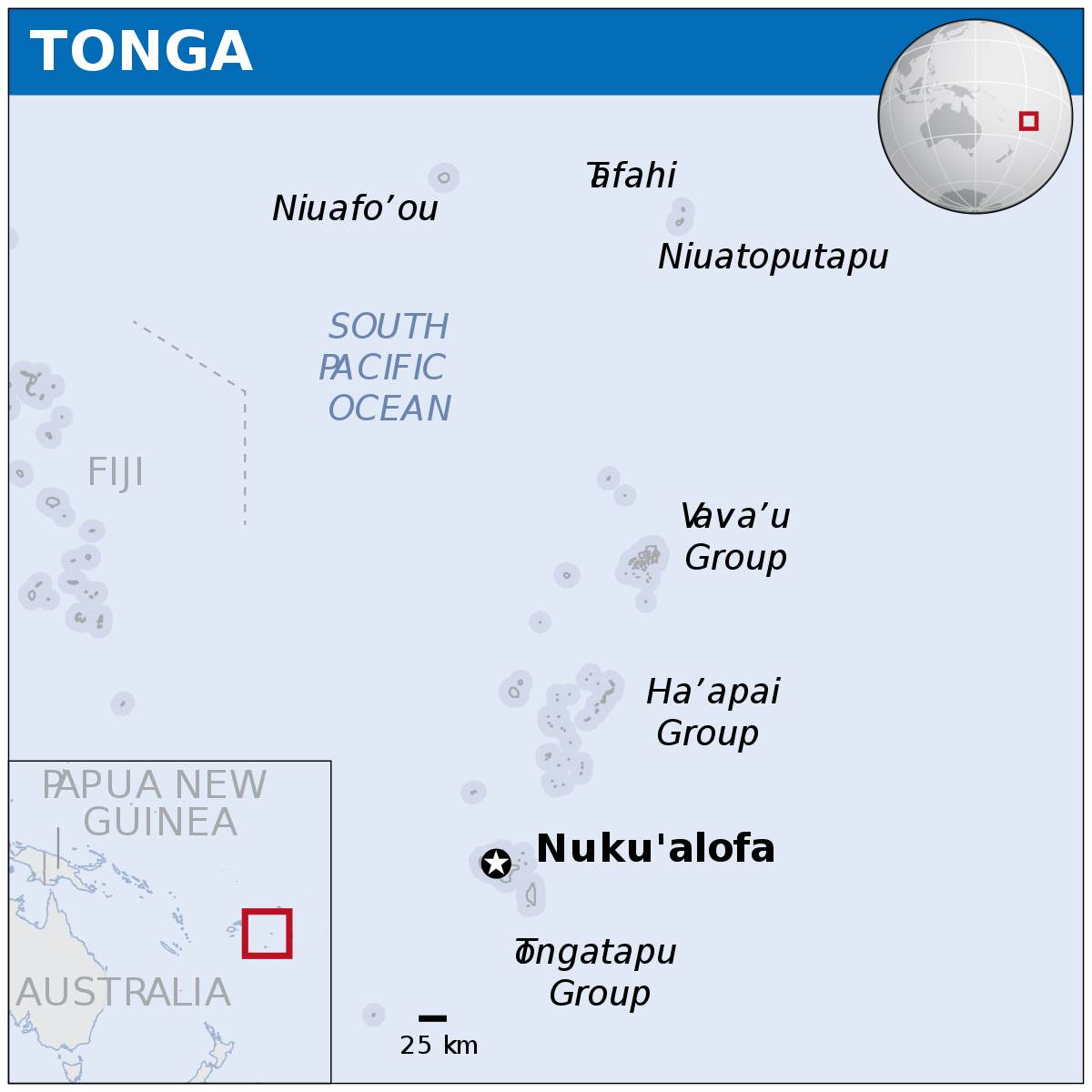
Tonga
International Disaster Response Law in the Pacific
Overview

Legal Preparedness for International Assistance Assessment
1. Does Tonga have a clear legal framework for disaster risk management which includes procedures relating to international assistance?
The EMA and the NEMP are the guiding documents providing for Tonga’s disaster risk management framework, however, following an emergency declaration, there are no prescribed timelines for requesting international assistance or indeed any information on what criteria such a request should be based upon. In practice, the Chairman of the NEMC will base a request for international assistance on the outcome of assessments undertaken to determine the needs of those affected, even if this means a possible delay in requesting international assistance as was the case in Tropical Cyclone Ian.
Although not referred to in the NEMP, in emergencies, emergency management authorities revert back to the practice under the 1999 National Disaster Management Plan (NDMP) which stated that the decision to request international assistance was to be determined by the NEMC, who will submit its recommendation through its Chairman to Cabinet. Section 10(e) of the EMA directs the NEMC to “have in place arrangements with other nationals and relevant bodies to provide support to the Kingdom during major emergencies”.
The Minister of Foreign Affairs (MFA) is responsible for requesting international assistance upon the direction of Cabinet and also for taking on the role of focal point for overseas emergency relief assistance and external relations. There is provision in the Tonga Fire and Emergency Services Act 2016 for international assistance in an emergency which states that a member of an international emergency service organisation who is present at an emergency within the Kingdom for the purpose of mitigating or responding to that emergency may be approved by the Commissioner to perform all or some of the functions that the Commissioner would have and be capable of exercising and performing under this Act. Apart from this however there are no standard procedures, no specifically appointed authorities and no specific timelines governing the request of international assistance.
2. Do Tonga’s laws and regulations clearly set out a focal point for coordinating international disaster assistance?
As mentioned above, MFA acts as the focal point for overseas emergency relief assistance and external relations. However, there is no mechanism in place to ensure that requests for international assistance between the Government and lead agencies are complementary nor is there an information focal point to monitor and review the progress of deployment and distribution of relief goods and services although there are collaborative processes between relevant Ministries such as the Ministry of Finance and NEMO, however these are by and large ad hoc in nature.
Under the 1999 NDMP, all international assistance protocols fell under the responsibility of a designated Central Control Group (CCG). All departments and organisations requiring assistance were to submit their needs to the CCG and the CCG were tasked with liaising directly with international aid agencies and donor countries. The CCG were also held accountable to overseas partners for reporting on expenditure and assistance provided by each agency or donor country. These provisions however, have not been mirrored in the NEMP.
3. Do Tonga’s laws and regulations outline the roles and responsibilities of different institutions relating to international disaster assistance?
The NEMP outlines the roles of the various national, district and village emergency management committees and the National Emergency Management Office. It canvasses procedures for domestic response however has very little mention of international assistance as detailed below.
The NEMP states that the NEMC must have arrangements in place with States and relevant agencies to provide support to Tonga during major emergencies (even though what constitutes a major emergency is not defined); the Ministry of Foreign Affairs must act as the liaison between the NEMC and the diplomatic corps within Tonga and also act as Tonga’s representative externally, liaising with donor countries and aid agencies. The NEMP further states that Initial National Situation Reports are to be provided at varying intervals to international actors such as UNOCHA, SOPAC and the diplomatic corps, and also makes provision for Tonga Red Cross to seek assistance from the International Federation of Red Cross and Red Crescent Societies for international relief when required.
4. Do Tonga’s laws and regulations outline a process for requesting/welcoming offers of international disaster assistance, and for terminating international assistance?
As stated above under Question 1, there is minimal reference in Tonga’s disaster management framework to international assistance. The Minister of Foreign Affairs is responsible for requesting international assistance upon the direction of Cabinet and in practice, Cabinet’s direction is based upon the outcome of detailed needs assessments by the relevant authorities. There are no specific provisions for the acceptance or refusal of international assistance although such discourse can be inferred as being a natural part of MFA’s function under s10(e) of the EMA.
The EMA makes reference to a State of Emergency, which must be declared by the Prime Minister and lasts for a period of 28 days unless extended. In addition both the EMA and the NEMP reference a “recovery” phase (which the NERC is charged with managing). However there is no definition of when the “recovery” phase begins, how it is terminated or how it relates to the initial disaster relief phase. There are also no references in existing legal frameworks dealing with agreements on pre-positioning of relief stock or on unsolicited goods although the NEMC could exercise its authority under s10(e) of the EMA.
5. Do Tonga’s laws and regulations provide for necessary legal facilities to be provided to international assisting actors?
Legal facilities for some international actors can be found across a number of Acts and Regulations, however these are not coordinated and are not specific to disaster personnel. For example, a foreign driver’s license is recognised in Tongan law, however, local registry is mandatory and comes at a cost and there are no exemptions for emergency purposes for registration or waiver of fees. The Traffic Act provides for special defences for drivers charged with speeding in certain emergency circumstances. The defence does not expressly cover international actors in emergency situations.
The International Organisations (Immunities and Privileges of Certain Officers) Act 1967 and the Special Missions Privileges and Immunities Act 1877 extend privileges and immunities to special missions of states and international organisations according to relevant international conventions.
The Customs Division of the Ministry of Revenue Services developed a set of Standard Operating Procedures (SOPs) to grant customs clearance free of all customs duties, excise taxes and charges for relief consignments. There is currently no provision in Tongan law for managing unused humanitarian goods. Goods that have not cleared customs and which are stored in customs warehouses are subject to a 6-week time limit. Upon expiry of the six weeks, the goods are sold at a public auction. Consignments that have cleared customs are subject to a 2-year limit on storage at customs warehouses before disposal procedures are engaged.
6. Do Tonga’s laws and regulations set out quality standards for international assisting actors?
Broadly speaking, there are no specific statutory provisions for emergency review of foreign qualifications. However exceptions exist to the recognition of medical qualifications as regulated by the Medical and Dental Practice Act 2001, the Nurses Act 2001 and the Pharmacy Act 2001. For example, under the Pharmacy Act 2001, the Minister may exempt (in writing) members of short-term visiting specialist health teams or individual pharmacists, or assistant pharmacists, from the requirements of the Act.481 In practice however, this is usually only applied to scheduled visiting teams rather than teams arriving for emergency purposes.
There are no provisions for the oversight of international actors, although Cabinet has general executive oversight of matters that may affect national interest.
7. Do Tonga’s laws and regulations set out eligibility requirements for international assisting actors to receive legal facilities?
Apart from what is contained in Question 5 above, there appears to be no provisions for the application for eligibility of international actors for legal facilities.
8. Do Tonga’s laws and regulations establish a specialized unit for expediting the entry of international disaster assistance?
There appear to be no relevant provisions establishing a specialised unit for expediting the entry of international disaster assistance into Tonga. Tonga’s IDRL report 2015 recommends the establishment of a Single Window International Facilitation Team (SWIFT) for this purpose, including the application process for eligibility.
9. Do Tonga’s laws and regulations provide adequate transparency, safeguards and accountability mechanisms governing international disaster relief and initial recovery assistance?
The Emergency Fund Act 2008 directs the Minister for Finance and National Planning (in consultation with Cabinet and NEMC) to determine the criteria for the allocation of the emergency funds for relief and reconstruction, however these criteria have yet to be developed. In addition to this, although not specific to disasters, a number of provisions provide for financial safeguards and accountability mechanisms:
-
The Minister and CEO of the Ministry of Finance and National Planning (MFNP) have principal responsibilities to receive and disburse international grants made to the government.
-
The Public Finance Management (PFM) Act 2002 also provides a safeguard against diversion and misappropriate of funds through the established procurement regulations and internal and external audit procedures.
-
The Auditor General is empowered under the Public Audit Act to audit the transactions, books, accounts and financial records of Ministries and Government agencies.
10. Do Tonga’s laws and regulations outline procedures for international disaster assistance sent from, and transiting through Tonga?
There appear to be no specific provisions governing procedures for international disaster assistance sent from, and transiting through Tonga’s borders, although a recommendations was made by Tonga’s IDRL report for the need for such provisions to cover issues such as facilitation for transit; transit facilities period; entitlement to transit facilities; disaster transit via; goods and equipment in transit and trans-shipment; and transport for transit and transshipment.
Laws, policies, plans and other resources
-
National Disaster Management Plan and Emergency Procedures
-
Standard Operating Procedures for the National Emergency Coordination Centre.
-
National Emergency Management Plan
-
National Tsunami Plan
-
International Disaster Response Law (IDRL) in Tonga
-
Climate Financing & Risk Governance Assessment
-
National action plan on climate change adaption and disaster risk management 2010–2015
-
Tonga’s Joint National Action Plan II 2018–2028
-
Tonga Strategic Development Framework II 2015–2025
-
MEIDECC commissioned desktop review (led to policy for new Emergency Management Act)
![]()

